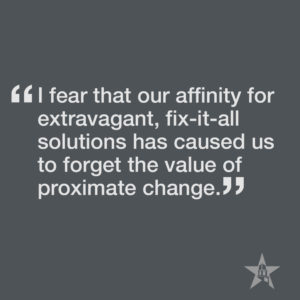Donald Trump’s presidency felt real to me for the first time when, in between classes, a friend asked, “Have you heard about the refugee ban?” Having avoided newspaper headlines and successfully blocked my ears from what was going on, I answered that no, other than what had been said on the campaign trail, I had not.
 I knew in that moment that I had ignored current events for a few weeks too long, and it had to stop. I spent that afternoon researching what I had missed and learned the details of the president’s proposed policy. The original executive order suspended the United States Refugee Admissions Program for 120 days and aimed to decrease the total number of refugee admissions by more than 50% during the coming fiscal year. Furthermore, it halted the resettlement of Syrian refugees and banned refugees from Iraq, Iran, Somalia, Libya, Sudan, and Yemen.
I knew in that moment that I had ignored current events for a few weeks too long, and it had to stop. I spent that afternoon researching what I had missed and learned the details of the president’s proposed policy. The original executive order suspended the United States Refugee Admissions Program for 120 days and aimed to decrease the total number of refugee admissions by more than 50% during the coming fiscal year. Furthermore, it halted the resettlement of Syrian refugees and banned refugees from Iraq, Iran, Somalia, Libya, Sudan, and Yemen.
Stories of refugee families, some of whom I have had the privilege to call neighbor and friend, flashed through my mind, and I realized the sadness and disappointment I felt was not so much about President Trump as it was about these beautiful people. I was reminded of a Somali mom I once tutored, who wanted to get her GED so she could get a better job and support her children. I remembered an Eritrean man who, over a table of homemade bread and chai tea, reflected, “We love Jesus, so we love other people and are kind to them.” I remembered the hours I spent playing soccer with a yard full of fifth graders. I could tell you lots of stories that I’m sure only tap the surface. From the city streets of Buffalo to the rolling hills of Rwanda, these encounters continue to challenge me.
As I read headline after headline, though, I felt powerless. After all, even politicians have few options when looking to respond to an executive order. What could I possibly do? I knew I cared about refugees, but my hands felt tied. You might ask what the point of all this is. This news broke weeks ago. The executive order has since changed. While I would certainly argue that refugee resettlement is still important, the issue at hand goes further.
I fear that our affinity for extravagant, fix-it-all solutions has caused us to forget the value of proximate change. While macro-level responses and policies are both necessary and valuable, we cannot neglect the small responses.
 In many ways, humans are limited. As a college student, I cannot force the President to rescind an executive order. People who respond to issues like climate change and global poverty are, in many ways, only chipping at the surface. We can only do so much. Still, we hope and persist. Jena Lee Nardella, the founder of the community health organization Blood:Water Mission says this about proximate change, “All our work—even if we lose, even if it is merely proximate is worth fighting for. The world is indeed a hard place to live, and it will likely break our heart if we keep engaging with it, but we choose to hope anyway.”
In many ways, humans are limited. As a college student, I cannot force the President to rescind an executive order. People who respond to issues like climate change and global poverty are, in many ways, only chipping at the surface. We can only do so much. Still, we hope and persist. Jena Lee Nardella, the founder of the community health organization Blood:Water Mission says this about proximate change, “All our work—even if we lose, even if it is merely proximate is worth fighting for. The world is indeed a hard place to live, and it will likely break our heart if we keep engaging with it, but we choose to hope anyway.”
My challenge for you is this: ask yourself what it is that you care deeply about, look at where your feet are planted and who you can serve right around you, and then do something. Call your congressional representatives, talk about it with a friend, attend a town hall meeting, or volunteer in your city. Proximate change might not be flashy and it will not solve everything overnight. On the other hand, if we let cynicism or a desire for grandeur keep us from starting somewhere, we might not ever start. In the small, people grow, minds are changed, and commitments are made. And to the Christian: we serve a God who is completely able, yet cares about and works even in the small. What a privilege it is that we might join him.
Emily is a senior majoring in political science and international development with a minor in Spanish.
